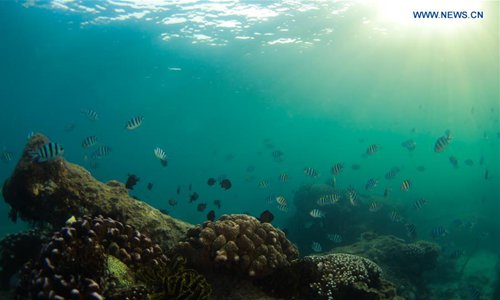HOME >> WORLD
Back from the dead: Some corals regrow after ‘fatal’ warming
Source:AFP Published: 2019/10/10 18:38:40

The underwater photo taken on Oct. 4, 2019 shows fishes swimming around corals at the Boundary Island Tourist Attraction in Lingshui County, south China's Hainan Province. Photo: Xinhua
For the first time ever, scientists have found corals that were thought to have been killed by heat stress have recovered, a glimmer of hope for the world's climate change-threatened reefs.
In the journal Science Advances, the chance discovery, made by Diego K. Kersting from the Freie University of Berlin and the University of Barcelona during diving expeditions in the Spanish Mediterranean, was reported Wednesday.
Kersting and co-author Cristina Linares have been carrying out long-term monitoring of 243 colonies of the endangered reef-builder coral Cladocora caespitosa since 2002, to describe in previous papers recurring warming-related mass mortalities.
"At some point, we saw living polyps in these colonies, which we thought were completely dead," Kersting told AFP, adding it was a "big surprise."
Coral are made up of hundreds to thousands of tiny creatures called polyps that secrete a hard outer skeleton of calcium carbonate (limestone) and attach themselves to the ocean floor.
Heat waves kill these animals, leading to coral bleaching.
A quarter of the coral cover of Spain's Columbretes Islands was lost to a particularly extreme heat wave in 2003.
But the researchers found that in 38 percent of the impacted colonies, the polyps had devised a survival strategy: shrinking their dimensions, partly abandoning their original skeleton, and gradually, over a period of several years, growing back and starting a new skeleton.
They were then able to gradually re-colonize dead areas through budding.
To be sure the polyps were in fact the same animals staging a comeback, rather than new coral created through sexual reproduction, the team used 3D computer imaging to confirm the old, abandoned skeleton was connected to the new structure.
This process of "rejuvenescence" had never before been observed in coral colonies that exist today.
Kersting said the finding opens up the intriguing possibility that other modern corals around the world might be applying similar survival strategies.
Posted in: EUROPE